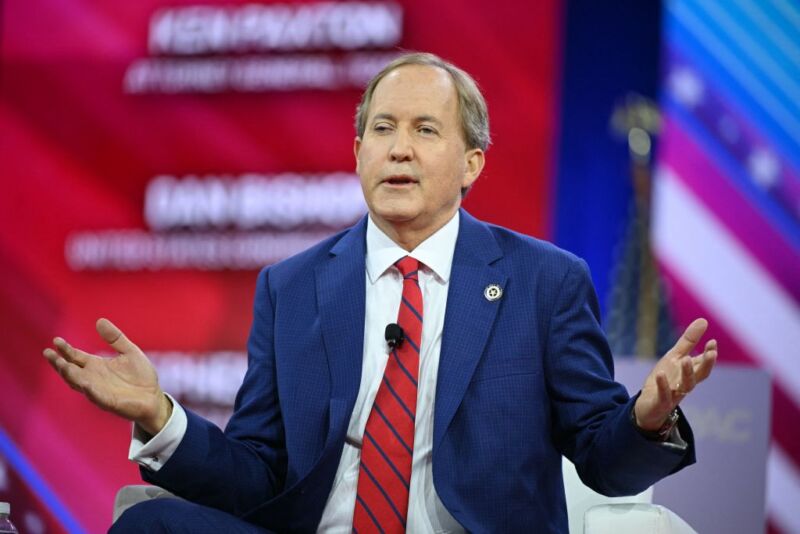
A judge has preliminarily blocked what Media Matters for America (MMFA) described as Texas Attorney General Ken Paxton’s attempt to “rifle through” confidential documents to prove that MMFA fraudulently manipulated X (formerly Twitter) data to ruin X’s advertising business, as Elon Musk has alleged.
After Musk accused MMFA of publishing reports that Musk claimed were designed to scare advertisers off X, Paxton promptly launched his own investigation into MMFA last November.
Suing MMFA over alleged violations of Texas’ Deceptive Trade Practices Act—which prohibits “disparaging the goods, services, or business of another by false or misleading representation of facts”—Paxton sought a wide range of MMFA documents through a civil investigative demand (CID). Filing a motion to block the CID, MMFA told the court that the CID had violated the media organization’s First Amendment rights, providing evidence that Paxton’s investigation and CID had chilled MMFA speech.
Paxton had requested Media Matters’ financial records—including “direct and indirect sources of funding for all Media Matters operations involving X research or publications”—as well as “internal and external communications” on “Musk’s purchase of X” and X’s current CEO Linda Yaccarino. He also asked for all of Media Matters’ communications with X representatives and X advertisers.
But perhaps most invasive, Paxton wanted to see all the communications about Media Matters’ X reporting that triggered the lawsuits, which, as US District Judge Amit Mehta wrote in an opinion published Friday, was a compelled disclosure that “poses a serious threat to the vitality of the newsgathering process.”
Mehta was concerned that MMFA showed that “Media Matters’ editorial leaders have pared back reporting and publishing, particularly on any topics that could be perceived as relating to the Paxton investigation”—including two follow-ups on its X reporting. Because of Paxton’s alleged First Amendment retaliation, MMFA said it did not publish “two pieces concerning X’s placement of advertising alongside antisemitic, pro-Nazi accounts”—”not out of legitimate concerns about fairness or accuracy,” but “out of fear of harassment, threats, and retaliation.”
According to Mehta’s order, Paxton did not contest that Texas’ lawsuit had chilled MMFA’s speech. Further, Paxton had given at least one podcast interview where he called upon other state attorneys general to join him in investigating MMFA.
Because Paxton “projected himself across state lines and asserted a pseudo-national executive authority,” Mehta wrote and repeatedly described MMFA as a “radical anti-free speech” or “radical left-wing organization,” the court had seen sufficient “evidence of retaliatory intent.”
“Notably,” Mehta wrote, Paxton remained “silent” and never “submitted a sworn declaration that explains his reasons for opening the investigation.”
In his press release, Paxton justified the investigation by saying, “We are examining the issue closely to ensure that the public has not been deceived by the schemes of radical left-wing organizations who would like nothing more than to limit freedom by reducing participation in the public square.”
Ultimately, Mehta granted MMFA’s request for a preliminary injunction to block Paxton’s CID because the judge found that the investigation and the CID have caused MMFA “to self-censor when making research and publication decisions, adversely affected the relationships between editors and reporters, and restricted communications with sources and journalists.”
“Only injunctive relief will ‘prevent the [ongoing] deprivation of free speech rights,'” Mehta’s opinion said, deeming MMFA’s reporting as “core First Amendment activities.”
Mehta’s order also banned Paxton from taking any steps to further his investigation until the lawsuit is decided.
In a statement Friday, MMFA President and CEO Angelo Carusone celebrated the win as not just against Paxton but also against Musk.
“Elon Musk encouraged Republican state attorneys general to use their power to harass their critics and stifle reporting about X,” Carusone said. “Ken Paxton was one of those AGs that took up the call and he was defeated. Today’s decision is a victory for free speech.”
Paxton has not yet responded to the preliminary injunction and his office did not respond to Ars’ request to comment..
Media Matters’ lawyer, Aria C. Branch, a partner at Elias Law Group, told Ars that “while Attorney General Paxton’s office has not yet responded to Friday’s ruling, the preliminary injunction should certainly put an end to these kind of lawless, politically motivated attempts to muzzle the press.”
